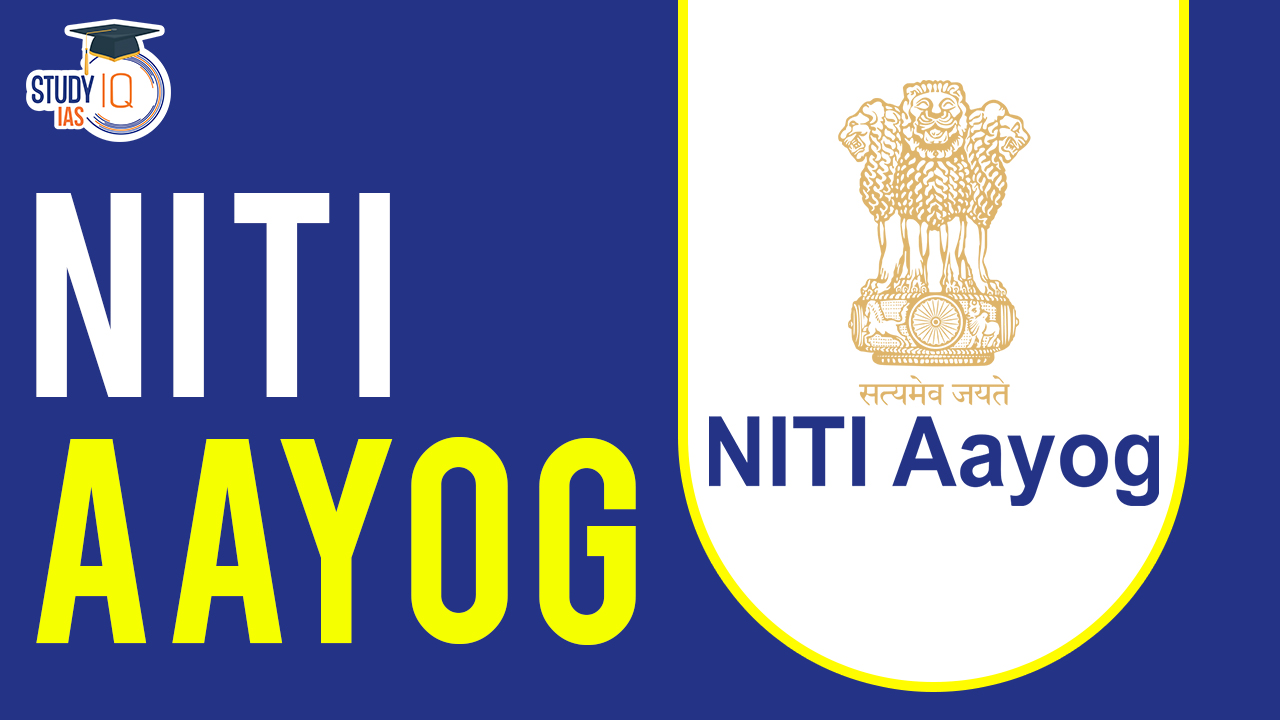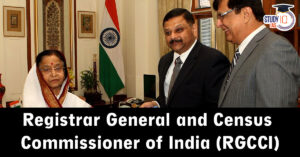Table of Contents
NITI Aayog
The NITI Aayog, short for National Institution for Transforming India, is a policy think tank and government institution in India. It was established on January 1, 2015, to replace the Planning Commission. NITI Aayog serves as a platform for cooperative federalism and policy formulation, focusing on fostering sustainable and inclusive economic growth, strategic thinking, and innovation. It works towards achieving development goals through collaborative efforts with state governments, experts, industry stakeholders, and international organizations.
NITI Aayog plays a vital role in shaping India’s development agenda, promoting reforms, and facilitating the implementation of transformative policies across various sectors.
NITI Aayog Objectives
The objectives of NITI Aayog (National Institution for Transforming India) are as follows:
- Foster Cooperative Federalism: NITI Aayog aims to promote cooperative federalism by facilitating collaboration and constructive engagement between the central government and state governments. It strives to ensure the active participation of states in the planning and decision-making process, fostering a more inclusive and decentralized approach to governance.
- Policy Formulation and Implementation: NITI Aayog is responsible for formulating policies and strategic plans to address key developmental challenges and opportunities in various sectors. It conducts research, analysis, and consultations to develop innovative and evidence-based policies, focusing on sustainable economic growth, social welfare, and overall transformation.
- Catalyze Reforms: NITI Aayog acts as a catalyst for reforms across sectors. It identifies policy bottlenecks, recommends policy changes, and promotes initiatives to foster efficiency, competitiveness, and productivity. The aim is to create an enabling environment for inclusive and sustainable development, promoting entrepreneurship, innovation, and ease of doing business.
- Strengthen Monitoring and Evaluation: NITI Aayog focuses on monitoring and evaluating the implementation of programs and policies, assessing their impact and effectiveness. It adopts performance indicators, sets targets, and regularly tracks progress to ensure accountability, transparency, and efficient utilization of resources.
- Knowledge and Innovation Hub: NITI Aayog serves as a knowledge and innovation hub, engaging with experts, think tanks, and research institutions to gather insights, expertise, and best practices. It fosters collaboration, research partnerships, and knowledge-sharing to drive evidence-based policymaking and leverage technology for sustainable development.
- International Engagement: NITI Aayog plays a vital role in fostering international cooperation and engagement. It represents India in international forums, promotes dialogue and collaboration with other countries, and leverages global best practices and experiences to inform India’s development strategies.
NITI Aayog Functions
NITI Aayog (National Institution for Transforming India) performs a range of functions to support India’s development agenda. Some of the key functions performed by NITI Aayog are as follows:
- Policy Formulation: NITI Aayog is responsible for formulating policies and strategic plans to address developmental challenges and opportunities in various sectors. It conducts research, analysis, and consultations to develop innovative and evidence-based policies.
- Monitoring and Evaluation: NITI Aayog monitors and evaluates the implementation of programs and policies, assessing their impact and effectiveness. It sets performance indicators, tracks progress, and provides recommendations for improvements.
- Inter-governmental Coordination: NITI Aayog fosters cooperative federalism by facilitating collaboration and engagement between the central government and state governments. It acts as a platform for dialogue, coordination, and sharing of best practices among different levels of governance.
- Promoting Reforms: NITI Aayog acts as a catalyst for reforms across sectors. It identifies policy bottlenecks, recommends policy changes, and promotes initiatives to foster efficiency, competitiveness, and productivity.
- Research and Knowledge Sharing: NITI Aayog serves as a knowledge hub by engaging with experts, think tanks, and research institutions. It conducts research, promotes data-driven decision-making, and facilitates knowledge-sharing to inform policy formulation and implementation.
- Capacity Building: NITI Aayog focuses on capacity building by providing guidance, technical assistance, and training to stakeholders at various levels. It aims to enhance the capacity of government officials, institutions, and communities for effective implementation of policies and programs.
- International Engagement: NITI Aayog represents India in international forums, promotes dialogue and collaboration with other countries, and leverages global best practices and experiences to inform India’s development strategies. It facilitates international cooperation and shares India’s experiences with other nations.
- Innovation and Entrepreneurship: NITI Aayog promotes innovation, entrepreneurship, and start-up ecosystem in India. It supports initiatives and policies to foster a culture of innovation, technology adoption, and entrepreneurship, thereby driving economic growth and job creation.
These functions collectively contribute to NITI Aayog’s role in shaping India’s development agenda, fostering sustainable and inclusive growth, and facilitating effective governance through evidence-based policymaking and collaborative approaches.
Read about: List of Beti Bachao Beti Padhao Scheme
NITI Aayog Structure
NITI Aayog has a hierarchical structure with different levels of authority and responsibility. The key components of its structure are as follows:
| Hierarchical Structure | Details |
| Governing Council | Chaired by the Prime Minister of India. Includes Chief Ministers of all states and Union Territories with legislatures, along with other members. Provides overall guidance and direction to NITI Aayog. |
| Regional Councils |
|
| Full-Time Members |
|
| Part-Time Members |
|
| Chief Executive Officer (CEO) |
|
| Experts and Professionals |
|
| Verticals/Divisions |
|
| Support Staff |
|
This hierarchical structure facilitates coordination, collaboration, and efficient functioning of NITI Aayog, ensuring effective policy formulation, implementation, and monitoring to achieve the institution’s objectives.
Read about: Important Schemes of Indian Government
NITI Aayog Vice Chairman
Suman Bery currently holds the position of Vice Chairperson at NITI Aayog, with the rank and status equivalent to a Cabinet Minister. With a wealth of experience as a policy economist and research administrator, Mr. Bery assumed the role of NITI Aayog Vice Chairperson on May 1, 2022. Prior to his appointment, he served as a Senior Visiting Fellow at the Centre for Policy Research in New Delhi.
Additionally, he held the position of Global Fellow in the Asia Programme at the Woodrow Wilson International Centre for Scholars in Washington D.C. and was a non-resident fellow at Bruegel, an economic policy research institution based in Brussels. Mr. Bery also served as a board member of the Shakti Sustainable Energy Foundation in New Delhi.
Read about: Five Year Plans of India
NITI Aayog Chairperson
NITI Aayog operates under the guidance and leadership of the Prime Minister of India. The Prime Minister serves as the de facto Chairperson of NITI Aayog and provides overall guidance and direction to the institution.
Read about: Finance Commission
NITI Aayog UPSC
The topic of NITI Aayog is important for UPSC (Union Public Service Commission) as it is a part of the UPSC Syllabus for various exams conducted by the commission. NITI Aayog holds significance in India’s governance and policy-making, and understanding its objectives, functions, and structure is crucial for aspirants preparing for UPSC exams. UPSC Online Coaching and UPSC Mock Tests often cover this topic to provide comprehensive preparation and familiarize candidates with India’s developmental policies, cooperative federalism, and government institutions.
Read about: Constitution of India


 Mechanisms to Combat Judicial Corruption...
Mechanisms to Combat Judicial Corruption...
 Registrar General and Census Commissione...
Registrar General and Census Commissione...
 Ambedkar Jayanti 2025: Biography, Legacy...
Ambedkar Jayanti 2025: Biography, Legacy...





















